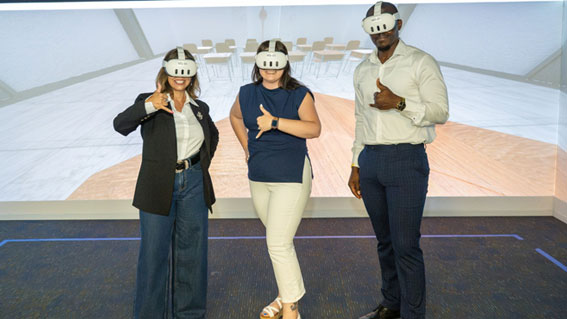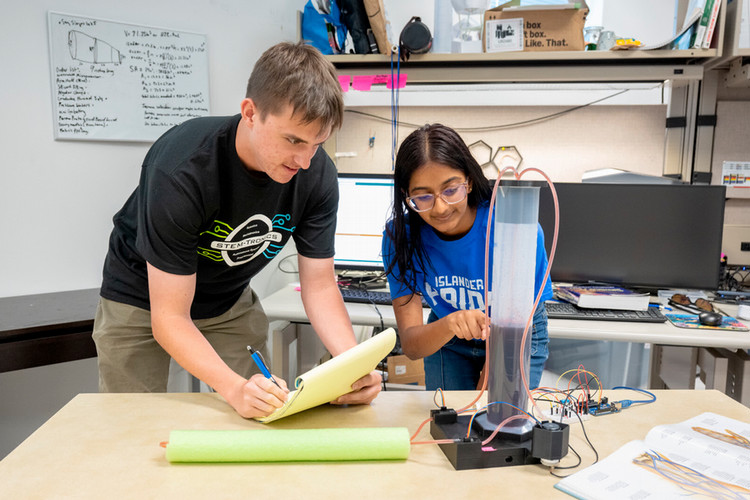Harte Research Institute Announces Inaugural HRI Fellows
CORPUS CHRISTI, Texas — Three Texas A&M University-Corpus Christi researchers were selected for two-year appointments with the Harte Research Institute for Gulf of Mexico Studies as a part of its inaugural HRI Fellows program. The program, which selected scholars from across disciplines at TAMU-CC, promotes transdisciplinary research projects at HRI and the University.
The fellows include an environmental historian, an applied linguist, and a biomedical researcher. Each researcher was nominated for their appointment by a current HRI chair, with whom they will collaborate on a shared project that combines their expertise. Each fellow will be provided with seed money by HRI to support their collaborative project. The program was designed to enhance engagement between HRI and TAMU-CC researchers.
“The HRI Fellows bring expertise that expands our reach and the applications of what our science can do here at HRI. This program will build bridges with the rest of the Texas A&M University-Corpus Christi community,” said HRI Senior Executive Director Dr. David Yoskowitz. “We plan to learn a lot from our first class of HRI Fellows.”
The inaugural HRI Fellows include:
Dr. Jen Brown is the Joe B. Frantz Associate Professor of History at Texas A&M University-Corpus Christi. She is an environmental historian interested in the history of fisheries, animals, conservation, and natural resource policy. Brown is the writer, producer, and narrator of The Gulf Podcast, which was produced with support from HRI. Her first book, Trout Culture: How Fly Fishing Forever Changed the Rocky Mountain West, received critical acclaim. She is currently working on a second book entitled The Fantastically Strange Cold War History of Dolphins about the release of two laboratory dolphins in Hawaii — the first successful animal liberation act in U.S. history — to show how dolphins became beloved during the age of ecology.
Brown will work with HRI Chair for HydroEcology Dr. Paul Montagna on his project to write a new version of the book Freshwater Inflow to Texas Bays and Estuaries, recording oral histories and documenting the history of freshwater inflow management in Texas. Those interviews will also support her podcast, The Gulf.
Dr. Shannon Fitzsimmons-Doolan is an applied linguist and an associate professor of English at Texas A&M University-Corpus Christi who specializes in applied corpus linguistics, language policy, language ideologies, and content-based instruction. Much of her scholarly work documents and explores the distribution of latent, socially held beliefs about or encoded in language. She is particularly interested in developing methodological approaches for such study at scale. She has published in journals such as Corpora; International Journal of Bilingual Education and Bilingualism; Language Awareness; Language Policy; Journal of Language, Identity, and Education; and TESOL Quarterly.
Fitzsimmons-Doolan will work with HRI Chair for Coastal Conservation and Restoration Dr. Jennifer Pollack to examine perceptions of habitat restoration before and after ecological disasters by studying the language used in public communications, and looking at whether that language can shed light on stakeholder perceptions and decision-making processes.
Dr. Wei Xu is an Assistant Professor of Marine Biomedical Science in the Department of Life Science at TAMU-CC. His research focuses on the environmental impacts on the toxicities of marine pollutants to humans and marine organisms. Two of his projects in toxicity assessment of photodegraded PAHs (polycyclic aromatic hydrocarbons, a class of chemicals that occur naturally in coal, crude oil, and gasoline) on Eastern oysters and human skin health were funded by the National Science Foundation and National Institute of Health, respectively. He is also studying the microbial biofilm formations under the water flow, which contribute to the control of microbiofoulings in the coastal areas, a project funded by the Department of Defense Office of Naval Research. Xu’s work is also supported by the Cancer Prevention and Research Institute of Texas to develop an early cancer diagnostic tool.
Xu will work with HRI Chair for Ecosystem Science and Modeling Dr. Xinping Hu to investigate the environmental impacts on bivalve shell formation during larval development. This research will contribute to the restoration of bivalve habitats in the Gulf of Mexico and oyster aquaculture in Texas.







